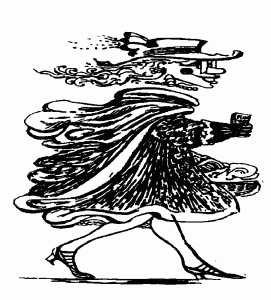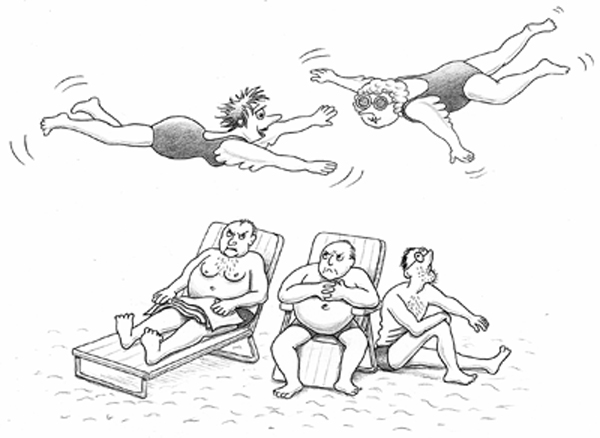Rufus Segar whose illustrations have graced several Third Age Press books, has gone to wherever anarchists go when they die. We have been blessed to have been able to share his talents with our readers and happy to reprint the obituary published by The Guardian in ‘Other Lives’ and written by his son Rupert. This is one of my favourite drawings – I believe it was based on Carol, partner of Rufus’s friend and collaborator, Tony Gibson – for our most popular book ‘On The Tip of Your Tongue’ – and to me shows a mature woman full of energy and purpose.

Rufus Segar – Illustrator, Artist and Anarchist
My father, who has died at the age of 82, was a designer of books and magazines, including one of the leading anarchist publications of the 1960s.
He was born Patrick Segar in Ipswich, the son of Ethel (nee Bomber) and Eric Segar, a pharmacist and a member of the Magic Circle. As a child, Rufus went to a number of schools as his father set up various ill-starred ventures. Eventually, Rufus took the unusual route of attending two grammar schools 6 miles apart in North Wales: one was Rhyll Grammar for an A-level in Maths; the other was St Asaph for an A-level in Art.
Then, at Liverpool College of Art, Rufus fell in with a group of anarchists and met his wife, Sheila Bullard. Fellow art students called him Rufus because of his abundant red hair and the name stuck.
Rufus followed Sheila to London and began work as a cardboard box designer and moved on to graphic design and layout and became a founding member of the Association of Illustrators, fighting for the rights of artists to retain their artwork.
In 1955, Rufus served three months in Pentonville Prison rather than do national service. As an anarchist, he said he could never obey an order to kill. During his time inside, Rufus was head librarian, made chess sets for the wardens and learned to roll cigarettes one-handed.
In the 1960s, Rufus designed and illustrated the monthly Anarchy magazine. It was his bold use of colour on the covers that gave the publication prominence. Every issue was an experiment in its own right, capturing the visual excitement of the decade.
Rufus worked for more than 30 years as an illustrator and graphic designer for the Economist Intelligence Unit. However, his greatest love was reserved for the books he illustrated: The Cockney Alphabet, Remember Hythe, and On the Tip of My Tongue, among the many volumes he enriched with his visual wit.
Rufus enjoyed his retirement in both Hythe, Kent and Pershore in Worcestershire. He held a sell-out exhibition of his pictures in Pershore in 2011. In recent years, he fell ill and became increasingly frail. For the last couple of years he stopped drawing, until, following medical treatment, he began sketching again shortly before his death.
He is survived by Sheila, me, my brothers, BJ and Dan, and two grandchildren, Hannah and Rufus.
Rufus Segar 28th August 1932 – 7th May 2015


 Age of Creativity is an online platform to share, celebrate and inspire work in the field of arts and older people.
Age of Creativity is an online platform to share, celebrate and inspire work in the field of arts and older people.